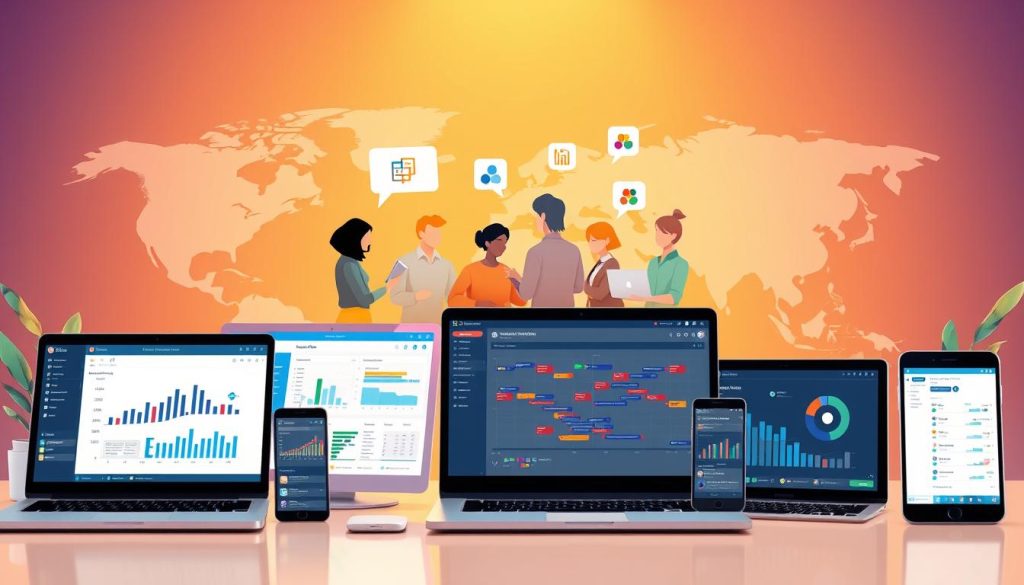Welcome to your complete guide on managing work from anywhere. This guide helps you find skilled professionals who can guide your initiatives to excellent outcomes.
Today’s business world is changing fast. Many companies now use experts who work from different locations. This approach brings many advantages to organizations of all sizes.
You can now find talented professionals worldwide. This gives you access to diverse skills and experience. Your team can include the best people regardless of where they live.
We’ll show you how to choose the right professional for your needs. You’ll learn about different service options and pricing models. Get ready to transform how you handle your important work!
Table of Contents
Key Takeaways
- Remote management services help businesses succeed from any location
- Global talent access provides diverse skills and expertise
- Cost-effective solutions work for companies of all sizes
- Various service packages meet different business needs
- Proper selection ensures project success and smooth collaboration
- Modern tools enable effective teamwork across distances
- Real-world examples demonstrate successful implementations
Introduction to Remote Project Management Services
Modern businesses need flexible solutions to stay competitive. Digital coordination services provide exactly that. These offerings help teams work together from different locations.
Companies today seek professionals who can guide their work from anywhere. This approach opens doors to global talent and diverse expertise. It’s a game-changer for organizations of all sizes.
What is a Remote Project Manager?
A digital coordinator oversees initiatives from any location. They use online tools to keep everything on track. This professional handles planning, execution, and final delivery.
These experts rely on platforms like Asana and Microsoft Teams. Strong communication skills are essential for success. They ensure smooth operations across distances.
Self-discipline and tech proficiency define these roles. They maintain visibility and collaboration without physical offices. The result is successful outcomes for all involved parties.
The Growing Demand for Remote Project Management
Globalization and digital transformation drive this trend. More companies embrace work-from-anywhere models. The pandemic accelerated this shift dramatically.
Businesses recognize the cost benefits and talent access. Organizations across sectors actively seek these professionals. IT, healthcare, and marketing fields show particular demand.
Recent job postings confirm this growth. Companies like Electric Hydrogen seek senior coordinators for European work. Fusion Consulting and Tugi Tark also list similar positions.
CoverGo specifically wants a Digital Insurance specialist for France-based initiatives. Specialized roles emerge in SAP implementation and technical programs. GitLab and Atlassian lead this hiring movement.
The trend shows no signs of slowing down. This approach has become mainstream rather than exceptional. It represents the future of how work gets done.
Benefits of Hiring a Remote Project Manager
Choosing the right professional brings many advantages to your organization. These benefits go beyond simple cost savings. They transform how your business operates and grows.

Companies worldwide are discovering these advantages. BTC Business Technology in Germany seeks SAP specialists. Avalerehealth and Vcluster want technical coordinators.
This shows the global nature of modern talent acquisition. You can find exactly the right skills for your needs.
Cost-Effective Project Solutions
Working with distributed professionals saves money in multiple ways. You eliminate expenses for office space and equipment. There are no utility costs or maintenance fees.
Recruitment becomes more affordable too. You avoid relocation packages and local hiring fees. Your budget stretches further with global talent pools.
- No physical office overhead costs
- Reduced equipment and supply expenses
- Flexible payment options: hourly, project-based, or retainer
- Lower recruitment and training investments
- Better budget control throughout the initiative
Access to Global Expertise
Geography no longer limits your talent search. You can find specialists with exactly the right skills. This includes rare expertise like SAP implementation.
Global professionals bring diverse perspectives. They’ve worked with international clients across cultures. This experience benefits your organization immediately.
You gain fresh approaches to challenges. Different backgrounds mean innovative solutions. Your team becomes stronger and more creative.
Flexibility and Scalability
Distributed work arrangements offer incredible adaptability. You can adjust resources based on current needs. There’s no long-term commitment required.
Scale your team up during busy periods. Reduce during slower times. This flexibility supports sustainable growth.
Time zone differences become advantages. Projects can progress across multiple regions. This accelerates timelines and improves outcomes.
Specialists can join for specific phases. You get expert help exactly when needed. This approach maximizes efficiency and results.
How to Find the Right Remote Project Manager
Discovering the perfect professional for your distributed team requires a strategic approach. The search process involves multiple channels and careful evaluation methods.
Companies like Hispanic Access Foundation and Avalerehealth actively seek these specialists. They use specialized platforms to connect with qualified candidates worldwide.
Where to Search for Qualified Professionals
Several platforms specialize in connecting businesses with distributed talent. These sites offer curated listings and advanced filtering options.
You can find professionals by location, experience level, and industry specialization. This makes your search more efficient and targeted.
- Specialized job platforms like Remotive and We Work Remotely feature pre-screened candidates
- Professional networking sites provide access to extensive networks of experienced professionals
- Industry-specific forums and communities host job boards for specialized talent
- Freelance marketplaces showcase vetted professionals with proven track records
- Professional associations maintain directories of certified experts available for engagements
Evaluating Portfolios and Experience
Reviewing candidate backgrounds requires attention to specific details. Look for demonstrated experience with distributed team coordination.
Assess the diversity and complexity of previous initiatives. Ensure the candidate has relevant experience for your industry and needs.
Check for relevant certifications that validate expertise. These credentials demonstrate commitment to professional development.
Evaluate technical proficiency with essential software and platforms. This ensures smooth integration with your existing systems.
When reviewing a senior project manager’s background, pay special attention to leadership experience and complex project delivery. These professionals typically bring 5-10 years of experience and advanced problem-solving skills.
Key Qualities of an Effective Remote Project Manager
Distributed team leaders need special skills to succeed. These professionals handle complex work from anywhere. Their unique abilities keep everything running smoothly.
Companies like BZ.medien Digital GmbH seek Scrum Masters with digital products expertise. Halo and Subzero want Technical Project Managers. GitLab hires Technical Program Managers for EMEA and Canada regions.

Communication Skills for Remote Work
Clear communication is essential for distributed teams. Professionals must express ideas clearly through writing and speaking. They set expectations without confusion.
Asynchronous communication helps with different time zones. Team members can work at their own pace. This approach respects everyone’s schedule.
Regular video meetings maintain team connection. Virtual gatherings keep everyone aligned. These sessions build trust and understanding.
Technical Proficiency and Tools Mastery
Modern tools make distributed work possible. Experts need deep knowledge of specific platforms. This includes Jira, Asana, and Microsoft Project.
Collaboration tools like Slack and Teams are vital. They enable instant messaging and file sharing. These platforms keep conversations organized.
Cloud storage and version control systems matter too. Cybersecurity knowledge protects sensitive information. These skills ensure safe operations.
Time Management and Organization
Excellent time skills help meet deadlines. Coordinating across time zones requires careful planning. Professionals must track multiple elements at once.
Detailed plans guide the entire process. Documentation keeps everything transparent. Team members always know what comes next.
Self-discipline replaces office structure. Motivation comes from within. This inner drive ensures consistent performance.
Adaptability solves unexpected problems. Changing requirements demand quick thinking. These skills turn challenges into opportunities.
| Quality Category | Specific Skills | Tools & Applications |
|---|---|---|
| Communication Excellence | Written clarity, verbal precision, meeting facilitation | Zoom, Microsoft Teams, email platforms |
| Technical Mastery | Software proficiency, cybersecurity, cloud management | Jira, Asana, Slack, Google Drive |
| Organizational Strength | Time management, documentation, multitasking | Trello, Notion, calendar applications |
| Personal Attributes | Self-motivation, adaptability, problem-solving | Personal productivity systems, learning platforms |
Remote Project Manager Services in France
France offers unique opportunities for digital coordination professionals. The market combines traditional business values with modern work approaches. This creates exciting possibilities for skilled professionals.
Companies like Early demonstrate this evolution perfectly. This Saint-Tropez agency manages social media for luxury brands. Their clients include hospitality, wine producers, and architecture firms.
Early maintains close relationships with fifty annual clients. They’re expanding to Courchevel, Cap Ferret, and international destinations. Their success shows how French businesses embrace digital transformation.
Understanding the French Market Landscape
France’s digital coordination sector grows rapidly. Tech companies and international businesses drive this expansion. EU initiatives support this positive trend.
Post-pandemic changes accelerated remote work adoption. French companies now welcome flexible arrangements. This shift opens doors for global talent.
Specific industries seek specialized expertise. Luxury goods, hospitality, and wine production need cultural understanding. These sectors value professionals who grasp French business etiquette.
Legal considerations require attention. French labor laws have specific requirements. Tax implications and data protection regulations matter too.
Cultural Considerations for French Projects
Business culture in France values formality and relationship building. Communication often follows traditional protocols. Understanding these nuances ensures smooth collaboration.
French professionals prioritize work-life balance. Scheduling should respect personal time and vacation periods. This approach builds trust and respect.
Language considerations play a role. Many businesses use English for international work. Basic French proficiency shows cultural appreciation.
Decision-making processes may seem hierarchical. Building trust takes time but yields strong partnerships. Patience during initial phases pays dividends.
Knowledge of local customs helps tremendously. French holidays affect scheduling. Business hours differ from other countries.
| Cultural Aspect | Consideration | Practical Application |
|---|---|---|
| Communication Style | Formal initial interactions | Use professional titles and formal greetings |
| Relationship Building | Time-intensive trust development | Schedule informal discussions before work details |
| Work-Life Balance | Respect for personal time | Avoid scheduling outside business hours |
| Decision Making | Hierarchical approval processes | Identify key decision-makers early |
| Holiday Planning | Extended summer vacations | Plan around August closures and national holidays |
Types of Remote Project Management Services Available
Businesses today can choose from diverse digital coordination services tailored to specific industries. These specialized offerings help companies achieve their goals with expert guidance.
Different sectors require unique approaches and skills. Understanding these variations helps you find the perfect fit for your organization’s needs.

IT and Tech Project Management
Technology initiatives demand specialized coordination skills. Professionals in this field handle complex software development and system implementations.
Companies like BTC Business Technology Consulting AG seek experts with S/4HANA Cloud expertise. These roles require deep technical knowledge and methodology mastery.
Technical coordination often involves Agile or Scrum approaches. Waterfall methods work better for some structured initiatives. The choice depends on team size and complexity.
These professionals coordinate development teams and QA testing. They manage deployment schedules and post-launch support. Specialized tools keep everything on track.
Creative and Marketing Project Management
Creative campaigns need different coordination approaches. These services focus on brand development and digital marketing strategies.
Beautiful.ai seeks professionals for design initiatives. These experts bridge gaps between designers, writers, and clients.
Marketing coordination includes timeline management for launches. Event planning and performance tracking across channels matter too. Consistency across all touchpoints is crucial.
Campaign effectiveness depends on smooth collaboration. Regular check-ins ensure brand alignment. Creative professionals thrive with clear direction.
Construction and Engineering Project Management
Physical projects also benefit from digital coordination. Engineering initiatives require specialized planning and compliance knowledge.
Electric Power Engineers recruits professionals for infrastructure work. These roles involve resource allocation and progress monitoring.
Engineering experts use CAD software for virtual reviews. Blueprint analysis happens through digital platforms. Remote site inspections utilize advanced imaging technology.
Regulatory compliance across locations is essential. Supplier and contractor coordination happens digitally. This approach saves time and resources.
Specialized coordination services exist for healthcare and education too. Nonprofit and government sectors have specific regulatory needs. Each field requires tailored approaches.
Understanding strategic project management helps you choose the right service type. This knowledge ensures better outcomes for your important work.
Pricing Models for Remote Project Management
Understanding how professionals structure their fees helps you budget effectively. Different approaches work for various situations and business needs. The right pricing model ensures fair compensation and successful outcomes.
Companies like Cotiviti and Rising Medical Solutions show diverse approaches. Their hiring practices indicate experience-based pricing structures. Specialized roles at Kivo and Nuvem often use fixed-price arrangements.
Let’s explore the most common fee structures available today. Each option offers distinct advantages for specific situations. Your choice depends on project scope and business requirements.
Hourly vs. Project-Based Rates
Hourly billing works well for ongoing initiatives with changing scope. Professionals track time spent on various tasks. This approach provides flexibility when requirements evolve.
Rates typically range from $35 to $150 per hour. Experience level and specialization influence the final cost. Complex technical work commands higher fees than general coordination.
Fixed-price arrangements offer budget certainty from the start. The total cost remains unchanged regardless of hours worked. This model requires clear deliverables and detailed planning.
Project-based pricing protects against scope creep. Changes usually require formal approvals and additional fees. This structure works best for well-defined initiatives.
Understanding Service Packages
Many professionals offer bundled solutions at different price points. These packages combine various services and tools. Tiered options provide increasing levels of support.
Basic packages might include essential coordination and reporting. Professional tiers add specialized tools and more frequent updates. Enterprise levels offer custom solutions and dedicated support.
Retainer arrangements provide ongoing assistance for a monthly fee. This model suits businesses with continuous initiative needs. You get consistent support without project limitations.
Some experts use value-based pricing tied to results. Fees connect to cost savings or revenue improvements. This approach aligns professional success with business outcomes.
| Pricing Model | Best For | Considerations | Typical Range |
|---|---|---|---|
| Hourly Rates | Evolving scope, ongoing work | Time tracking, flexible adjustments | $35-150/hour |
| Project-Based | Defined deliverables, fixed budgets | Detailed scope definition required | $2,000-25,000+ |
| Monthly Retainer | Continuous support needs | Predictable monthly expense | $1,500-8,000/month |
| Value-Based | Results-driven initiatives | Outcome measurement essential | Percentage of savings/value |
| Tiered Packages | Various business sizes | Scalable features and support | Basic: $1,000-3,000/month |
Additional costs may apply for specialized expertise or emergency support. Projects across multiple time zones might incur premium charges. Many professionals include software access in their fees.
Most experts offer free initial consultations. These discussions help understand your needs accurately. You receive tailored proposals based on specific requirements.
Remember that the cheapest option isn’t always the best value. Experience and specialization justify higher investment. The right professional delivers returns through efficient execution.
Getting Started with Your Remote Project Manager
Beginning your partnership with a digital coordinator requires careful preparation. This initial phase sets the foundation for successful collaboration and outstanding results. Companies like AuditBoard and HR Acuity demonstrate structured approaches to this process.
Proper setup ensures everyone understands their roles clearly. You establish workflows that support smooth operations across distances. This preparation phase makes all subsequent work more efficient.

Onboarding Process and Expectations
The journey starts with a comprehensive kickoff meeting. This session aligns everyone on goals, timelines, and communication methods. It’s your opportunity to share vision and establish working relationships.
Documentation review forms a crucial part of this phase. Your professional will examine project charters, scope documents, and existing processes. This background knowledge helps them understand context and constraints.
Access provisioning happens during this initial stage. You’ll provide necessary system credentials and tool permissions. Security protocols ensure safe remote operations from day one.
Clear expectations prevent misunderstandings later. Discuss availability windows, response times, and meeting schedules. Establish reporting frequency and format preferences upfront.
Setting Up Communication Channels
Effective dialogue keeps distributed teams connected and productive. Choose primary platforms that everyone can use comfortably. Options include Slack, Microsoft Teams, or similar collaboration tools.
Video conferencing enables face-to-face interactions despite physical distance. Regular visual contact builds trust and strengthens team bonds. These sessions work well for complex discussions.
Document sharing systems need careful configuration. Cloud storage with version control prevents confusion and duplication. Appropriate access levels protect sensitive information.
Emergency contact methods provide backup for urgent situations. Establish protocols for technical issues or critical decisions. This safety net ensures continuous progress.
Establishing Project Milestones
Clear markers guide your initiative toward successful completion. Use SMART criteria to define each significant point. This means making them Specific, Measurable, Achievable, Relevant, and Time-bound.
Milestone tracking includes deliverables and success criteria. Assign accountability for each phase to specific team members. This clarity prevents tasks from falling through gaps.
Risk assessment identifies potential challenges early. Develop contingency plans for likely obstacles. This proactive approach minimizes disruptions to your timeline.
Regular reviews ensure milestones remain appropriate as work progresses. Adjust timelines based on actual performance and changing circumstances. Flexibility supports better outcomes.
Success Stories: Remote Project Management in Action
Real-world examples demonstrate how distributed coordination delivers outstanding results. These success stories show what’s possible with the right approach and expertise.
Companies across industries achieve remarkable outcomes. They overcome distance challenges through smart strategies. Their experiences provide valuable lessons for others.
Case Study: French Digital Agency Transformation
Early agency in Saint-Tropez showcases exceptional distributed coordination. They manage social media for fifty luxury clients annually. Their portfolio includes hospitality, wine producers, and architecture firms.
The agency coordinates teams across multiple French locations. Paris-based strategists work with Marseille developers. Lyon designers complete this distributed creative team.
Their approach reduced project timelines by thirty percent. Agile methodologies improved delivery consistency significantly. Client satisfaction scores reached new heights.
Specialized software enabled better resource allocation. Overtime costs dropped by twenty-five percent. These savings supported expansion into new markets.
Early now serves clients in Courchevel and Cap Ferret. International growth includes Ibiza and Switzerland. Quality remains consistently high across all locations.
International Project Success Examples
Global software development initiatives show distributed coordination’s power. One project involved teams across Germany, India, and the USA. Clear communication protocols ensured smooth operations.
Cultural sensitivity training overcame language barriers. Regular virtual stand-ups kept everyone aligned. Transparent progress tracking maintained visibility.
The distributed team delivered two weeks ahead of schedule. This early completion impressed all stakeholders. It demonstrated effective cross-border collaboration.
Construction companies also benefit from distributed oversight. One firm managed multiple international sites remotely. Travel costs decreased by sixty percent.
Virtual inspections used drone technology and 3D modeling. Early issue identification prevented costly delays. Cloud-based tools enabled real-time contractor collaboration.
Marketing campaigns achieve impressive results through distributed coordination. One global brand campaign spanned five countries. Consistent messaging drove forty percent higher engagement.
These examples prove that structured remote roles deliver measurable benefits. They combine flexibility with corporate-grade performance standards.
Conclusion
Digital coordination has transformed how modern businesses achieve their goals. This approach has evolved from niche service to mainstream solution embraced worldwide.
The benefits are clear: significant cost savings, access to global talent, and remarkable operational flexibility. These advantages make distributed leadership an attractive option for modern organizations.
Success requires careful selection of qualified professionals with the right technical skills. Understanding market-specific considerations ensures effective international collaborations.
Various pricing models and service packages make these solutions accessible to all. Proper setup and communication establish foundations for outstanding results.
Growing success stories demonstrate that distributed teams deliver equal or better outcomes than traditional approaches. As technology advances, demand for skilled coordinators will only increase.
Businesses embracing this model gain competitive advantages through faster execution and specialized expertise. The future of initiative leadership is increasingly distributed, positioning adaptable organizations for global marketplace success.
FAQ
What does a remote project manager do?
A remote project manager leads teams and oversees projects from a distance. They handle planning, tracking, and delivery using digital tools. Their role ensures everything stays on track, even when working from different locations.
How can hiring a remote project manager save money?
You save on office space, equipment, and sometimes local salary rates. Plus, you pay only for the services you need. This approach makes managing budgets simpler and more efficient.
What should I look for in a remote project manager’s portfolio?
Check for experience with projects similar to yours. Look for success stories, client testimonials, and familiarity with tools like Asana or Trello. Strong communication and problem-solving skills are key indicators too.
Are there specialized services for tech projects?
Yes! Many professionals focus on IT and tech initiatives. They help with software development, system integrations, and tech team coordination. Their expertise keeps complex projects running smoothly.
What’s the best way to onboard a remote project manager?
Start with a clear introduction to your team and goals. Set up communication channels like Slack or Zoom. Define milestones early to align expectations and ensure a smooth start.
How do pricing models usually work for these services?
You can choose hourly rates or fixed project fees. Some offer package deals for ongoing support. Discuss your needs upfront to find the best fit for your budget and project scope.





